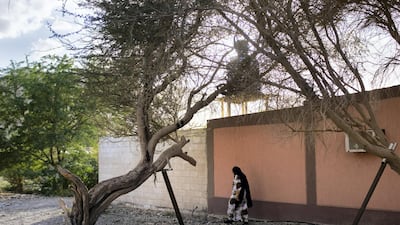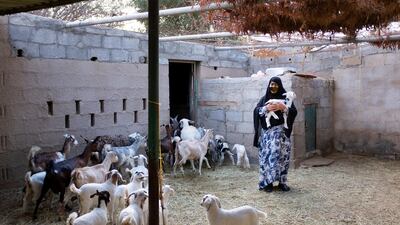Families living near a quarry in Ras Al Khaimah say the incessant explosions and plumes of dust are affecting their health and damaging their homes.
The villagers of Wadi Al Aim live about 1 kilometre from the limestone quarry that is located on the other side of a mountain, south-west of the village.
Families say some of the children have developed chronic coughs and respiratory problems because of the dust, which has also affected their livestock, killing at least 20 goats last year.
“This is not a new issue and we spoke about it many times and demanded a solution but nothing happened and the quarry is still operating near our village,” said Umm Salem, an Emirati mother of 10.
“Many children are coughing and visiting doctors for respiratory problems while 20 of my goats died last year due to the heavy amounts of dust and sand in the air caused by the quarry,” she said.
Umm Salem said the quarry has been causing pollution in the area.
“Wadi Al Aim is a natural place with fresh air but the area is not always clear depending on the quarry operations,” she said.
Wadi Al Aim is a mountainous village located around 50km south of Ras Al Khaimah city and 8km away from Adhen village.
Salem Al Mazroui, a 38-year-old Emirati living in Wadi Al Aim, said the tremors caused by explosions at the quarry has also damaged his home.
“The house is only 10 years old but it looks older due to the cracks on the walls and ceiling,” said Mr Al Mazroui, a father to three children.
“Some of the kitchen wall tiles have already fallen from their place and some are about to fall due to the strong shakes caused by the explosions. That is not safe and we cannot afford to pay thousands of dirhams on maintenance,” he said.
He too complained of the deteriorated air quality.
"Our children have not been affected by the dust yet, thank God, but other children in the village have suffered from respiratory problems because of it," Mr Al Mazroui said.
The trucks carrying the extracted limestone are also a point of contention for the villagers, saying they cause congestion and sometimes even accidents.
“We have only one road with one lane in each direction and allowing the lorries to use the same road cause traffic and accidents as many motorists try to overtake them,” said Umm Rashid, another Emirati resident.
Andrew Shakeshaft, a manager at Stevin Rock, the company that operates the Q3 site quarry, said local health and welfare is a top priority.
He said blasting operations are carried out under the supervision of fully qualified engineers to ensure safety.
“We have industry recognised best practice blast initiation systems using non-electric delayed detonators which enhance vibration control,” said Mr Shakeshaft, Q3 Operations Manager.
He said the company also measures vibrations and air over pressure caused by the explosions using two industry-recognised Vibrographs, to ensure they are within limits.
“Our explosive usage per ton of rock blasted has been steadily decreasing during the year and on-site operations overseen by Federal Police and Technicians.”
He said two fixed cameras monitor process areas and the company uses real-time monitoring in five locations for air quality and real-time monitoring in five locations for noise levels.
“We submit monthly reports to the Ministry of Climate Change and Environment and the Environment Protection and Development Authority that shows our compliance.
“Our Environmental Management Plan is endorsed by the government and has even been reviewed recently during a government visit with no issues raised for any site,” he said.
In 2017, families in Al Taween, a village 12km north of Wadi Al Aim, complained of similar issues caused by living near a quarry.
They said that the dust had caused many residents of the area to develop breathing problems. About 70 quarry companies operate in that area.






